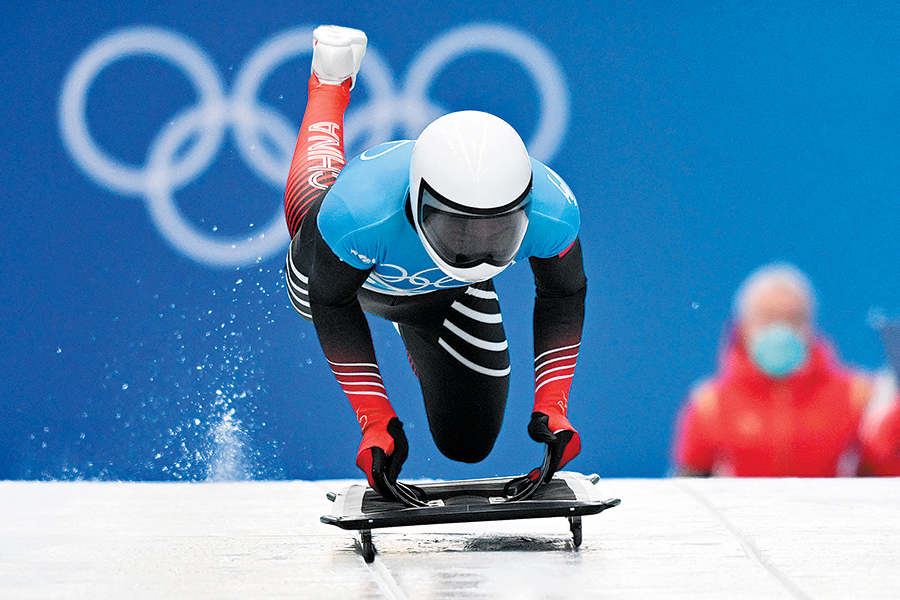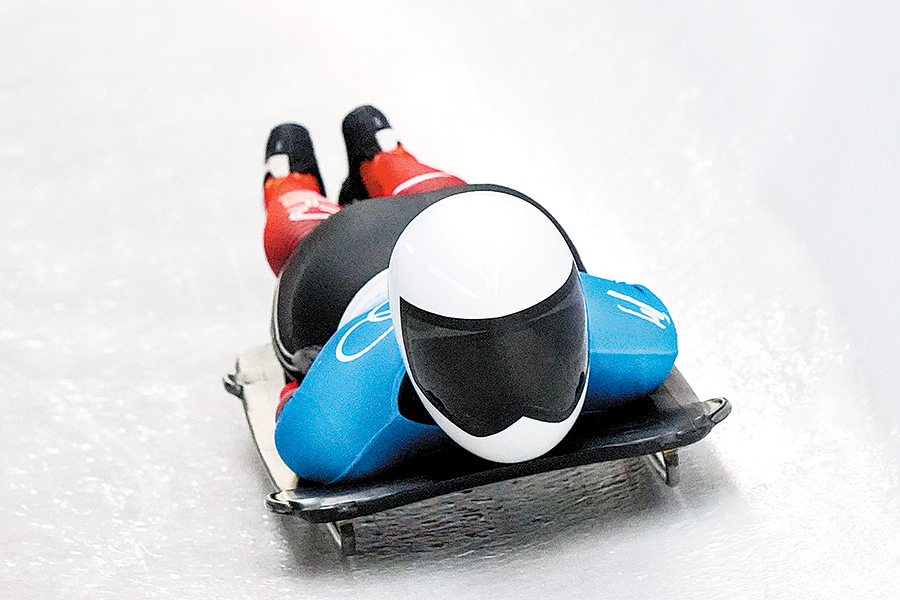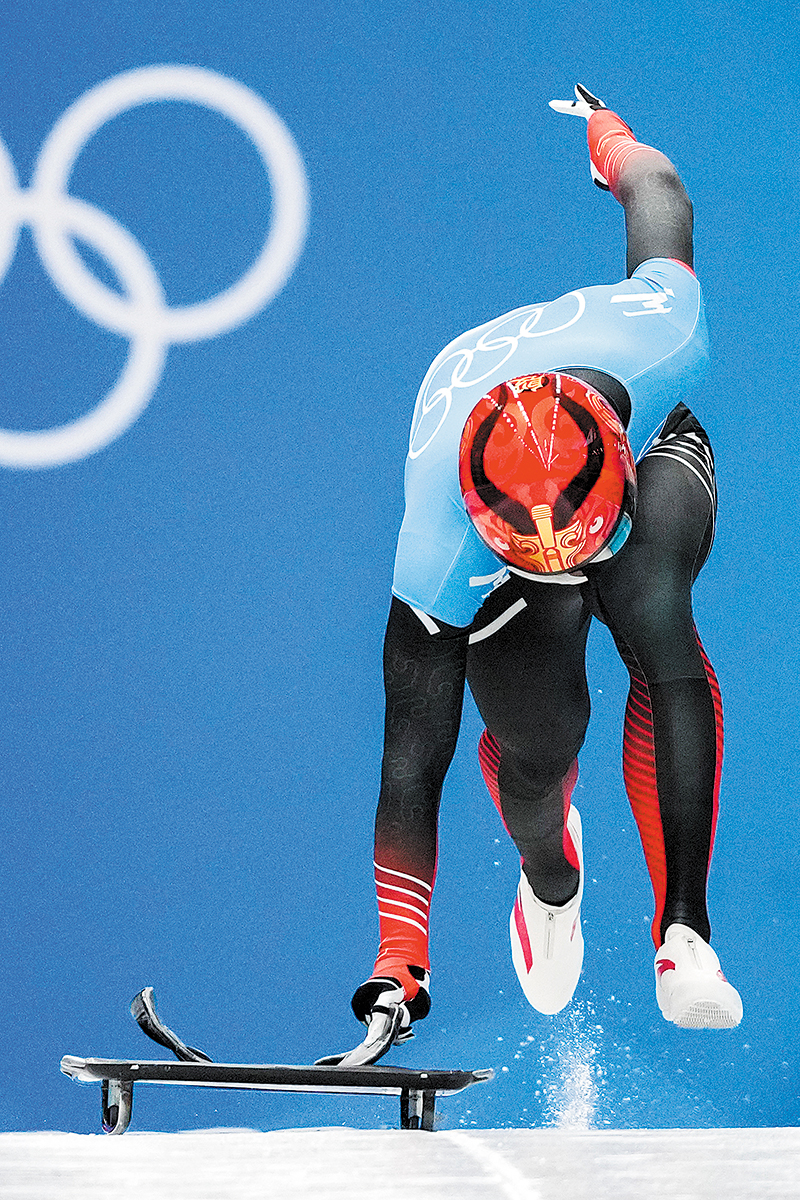The high-speed rise of China's skeleton stars

China's Yan Wengang gets off to flying start during the Beijing 2022 men's skeleton competition at Yanqing National Sliding Centre. Yan won bronze, China's first Olympic medal in any sliding sport. AFP
Despite having barely seven years' experience on the sliding track, China's young riders have taken the skeleton world by storm at Beijing 2022-and now they are already eyeing more glory.
China's biggest sliding success story was Yan Wengang, who fended off elite opponents to claim bronze in the men's skeleton and earn the host its first Olympic medal in any sliding sport.
The 24-year-old clocked 4 min 01.77 sec at the National Sliding Centre in Yanqing, with Germany's Christopher Grotheer (4:01.01) and Axel Jungk (+0.66 sec) taking gold and silver respectively. Another young Chinese star Yin Zheng also delighted the home fans with a fifth-place finish.
"I am both happy and a little disappointed, because I don't feel I performed to my absolute best. I made some mistakes during the competition. But I believe we can improve in the future," said Yan at a news conference on Sunday.
"Fighting spirit is key for the Chinese skeleton team. We race four heats, and there's no room for us to be conservative in terms of our line selection. Germany is by far the strongest. If we didn't give it our best shot, there's no way we'd be standing on the podium.
"That's why I felt I was not aggressive enough for the first two heats. For the last heat, I gave it all I had. Otherwise, I would have disappointed all the people who have helped and supported me."
The bronze marked only the second time that someone not from Europe or North America has stood on the Olympic skeleton podium.
"This medal should make China very confident in its skeleton future. We do have the ability to be competitive," Yan added.
"To beat Germany is very hard. No matter their pool of talent, their resources and technology, they're just so strong. But we never let that affect us."
Young talent Yin is also encouraged by Team China's surprising performance, and hopes to continue to raise his level going forward.
"This result definitely gives us some confidence for the future, and more people will pay more attention to skeleton. I've learned a lot from this experience," said Yin.
"Because Germany is so strong, I told myself not to overthink things and just focus on my own performance. After Beijing 2022, I will have a good rest and try to put on some weight, which can help me go faster in the future."

Zhao Dan of China races during the Beijing 2022 women's skeleton competition, en route to a ninth-place finish, last Friday. AP
In the women's skeleton on Saturday, Zhao Dan was the best-placed Chinese finisher in ninth, with Li Yuxi 14th-results that left their legendary Austrian coach Andreas Schmid more than pleased.
"We should never forget the great performance of the Chinese girls. What they have achieved is huge. People tend to focus on the boys. What I have observed from the girls is that they have huge potential and room for improvement," Schmid told reporters.
"Looking at their performances right now, we are surprised at their high level.
"I think it's a great opportunity to say it loud and clear that they have given a strong message to the young generation and also women in this country to succeed in sports."

Yin Zheng of China starts a run during the Beijing 2022 men's skeleton event on Friday in Yanqing. AP
Humble beginnings
What has surprised the world most is just how quickly the Chinese skeleton team has developed in the past few years.
The squad was only established in 2015, and the country's previous Olympic best in the sport was Geng Wenqiang's 13th-place finish at the 2018 Pyeongchang Games.
"Our team is very young. We only started to build our team in 2015 when we barely had any idea what skeleton is actually about," said team leader Sun Fan.
"We have experienced fast growth over the past few years, especially after the 2018 Winter Olympics. With the help of our head coach, the strength of our athletes has been developing fast, and that's why we can show our Chinese speed at the Beijing Winter Olympics.
"When I first became involved in skeleton, I presumed it would be easy, thinking that athletes just need to slide forward. However, the more you know about it, the more you realize how difficult it really is. Spectators might think the courses are narrow, but for our athletes they are very wide. The riders are just like Formula One drivers, choosing the best lines to take on the course."
Even getting to the bottom of the track was a challenge for China's young skeleton riders at the start of their careers. However, after years of hard work and scientific training, now the target is the podium.
"At first, we were scared. I remember at one point, I wasn't eating well because I was worrying about training and competing. But after about six years of training, I have run over 2,000 times on different courses. Now that I'm more experienced and know the sport and our equipment thoroughly, I'm not worried anymore," said Yan.
Compared to the likes of skiing and skating, sliding sports are still considered niche pursuits. The Chinese skeleton riders hope their performances at Beijing 2022 can attract more people to the sport.
"Many people are put off due to safety concerns about the sliding events, so not all parents would let their children participate in this sport," said young female star Li.
"But I remember when I competed in foreign countries, I noticed after our race, some school kids would take their equipment to slide on the course. I hope more people can try it and feel the charm of it."
Coach Schmid believes the gleaming new National Sliding Centre in Yanqing will also help boost participation numbers.
"In Germany, they have four tracks, so they would bring the school kids to the tracks to motivate them to come into the sport," said Schmid.
"Or take luge in Austria as an example-there, they bring families, friends and young people to the tracks to experience it.
"I want to change the word fear to respect. There's a key difference. We need to have respect for the speed. It's when you are afraid that it can be dangerous."
- Top legislature schedules standing committee session for late February
- China's top legislator meets with Uruguayan president
- Senior legislator surveys Anhui on formulating outline of provincial 15th Five-Year Plan
- China's top legislator meets with British PM
- NPC deputies see more engagement with top court



